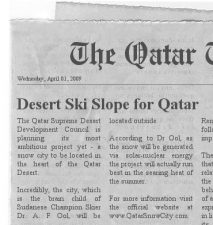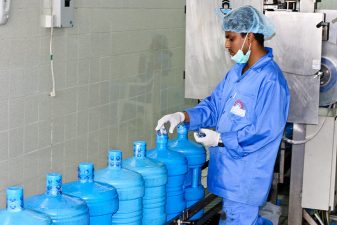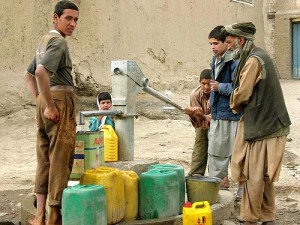 It’s World Water Day today, relevant and necessary for the Middle East.
It’s World Water Day today, relevant and necessary for the Middle East.
Well, not quite, but I got your attention. Raise an icy glass filled with clean water: it’s World Water Day. In 1992, the United Nations General Assembly declared each March 22 to be World Day for Water, raising awareness of water issues at local and global levels. The first World Water Day made a splash in 1993. Waves of educational events and symposia on water management and security cause participation to swell.
School kids and environmental groups keep the day vibrant. The internet makes event-promotion a snap. Particularly powerful is the UN’s website, which offers free campaign materials to help stage your own event, links to what others are doing, and methods to reduce your water footprint. Drink in their facts:
Why is water key to food security?
Erratic rainfall and seasonal differences in water supply cause food shortages. Drought is the most common cause of severe food shortages in developing countries, causing more deaths during the last century than any other natural disaster.
How much water is needed to produce our food?
Crop, livestock and aquaculture production require water sourced from rain and groundwater (green water) or from rivers, wetlands, lakes and aquifers (blue water). Globally, irrigation is 70% dependent on blue water withdrawals.There will be 9 billion people to feed on the planet by 2050. Meat consumption is expected to rise, in turn, demanding additional crop production for animal foodstock.
It takes 1500 liters of water to produce 1 kg of wheat, but it takes 15,000 liters to produce 1kg of beef.
How does water scarcity affect our food security?
Water scarcity affects every continent and more than 40% of earth’s population. By 2025, 1.8 billion people will be living in regions with absolute water scarcity. Two-thirds of the world could be living under water-tressed conditions. South Asia, East Asia and the Middle East are close to their resources limits, and populations are growing.
Is competition for water increasing?
Water demands of cities and industry are growing faster than agricultural demands. Non-food crops (e.g., biofuels) also compete for water. Utilizing food byproducts to produce biofuels (instead of growing specific bioenergy crops) would limit pressure on water resources and competition with food crops. Competition reduces access to water for the poor and other vulnerable groups.
How can we protect this precious resource?
Pollution reduces water availability. Pollution stems for inappropriate industrial and agricultural practices, and urban waste production. In agriculture, overuse of fertilizers and pesticides contaminates waterbodies. Intensive livestock production can also impact the quality of water resources. New, more integrated approaches to food production can substantially improve the situation. Drainage water, treated wastewater, brackish and desalinated water, especially in arid and semi-arid zones, can be recycled as a reliable source of water and nutrients for agriculture.
How can we reduce waste?
Roughly 30% of the food produced worldwide – about 1.3 billion tons – is wasted every year. In developing countries, losses occur between the farm and market because of poor storage and transport. In developed countries, particularly cities, food is wasted by consumers insensitive to the resources needed to produce it. Diets with excessive food intake are also a source of waste. Consumer attitudes must change. A 50% reduction of food waste at the global level would save 1,350 km3 of water (for comparison, the storage capacity of Egypt’s Lake Nasser is less than 85 km3).
When I was a kid, “Save Water” public service announcements perpetually ran on summer TV. Those old remedies remain valid. My parents skipped the car washing and let the lawn go brown. My brothers and I endured the “half-filled-bathtub” rule, which is why this video gem hit home for me:
Please take a swim through the Green Prophet archives to find excellent tips on choosing food with positive water impact. Maybe give meat a mini-vacation in your diet? Explore a hundred other excellent ways to celebrate World Water Day. Then exercise your new-found conservation savvy every day thereafter. To paraphrase my peers in the video: Keep the world wet. Save Warrrter.
Image of muscular man from Shutterstock



